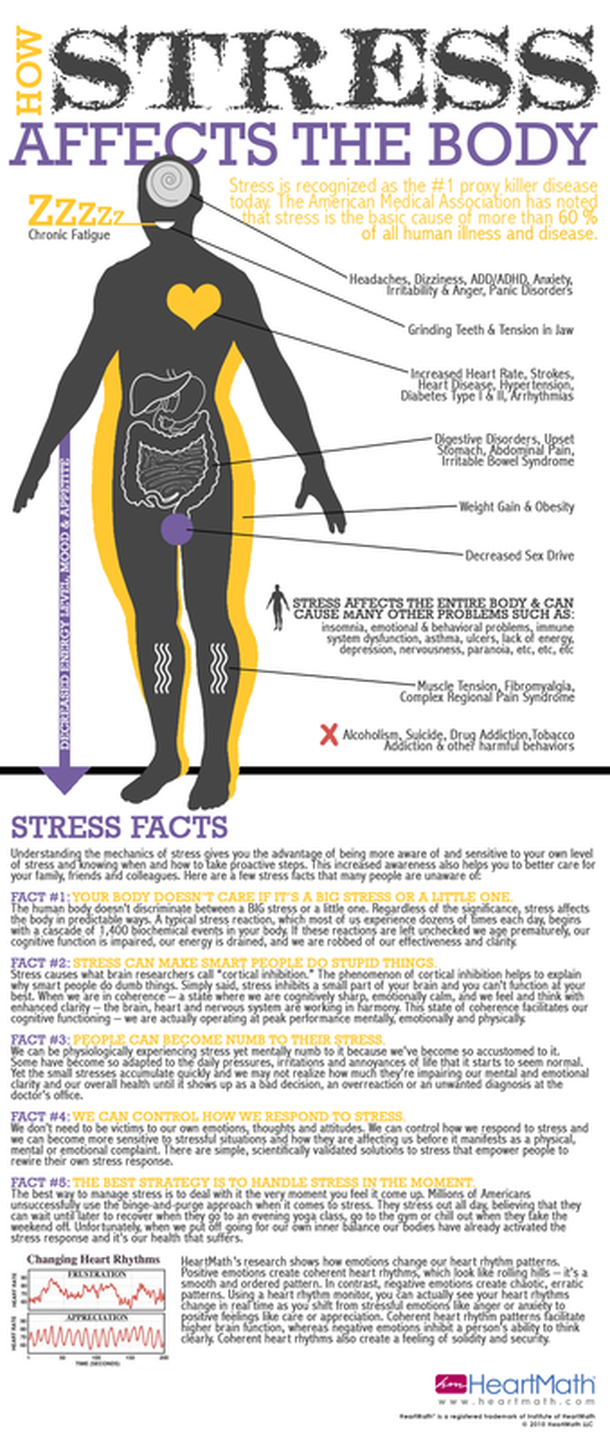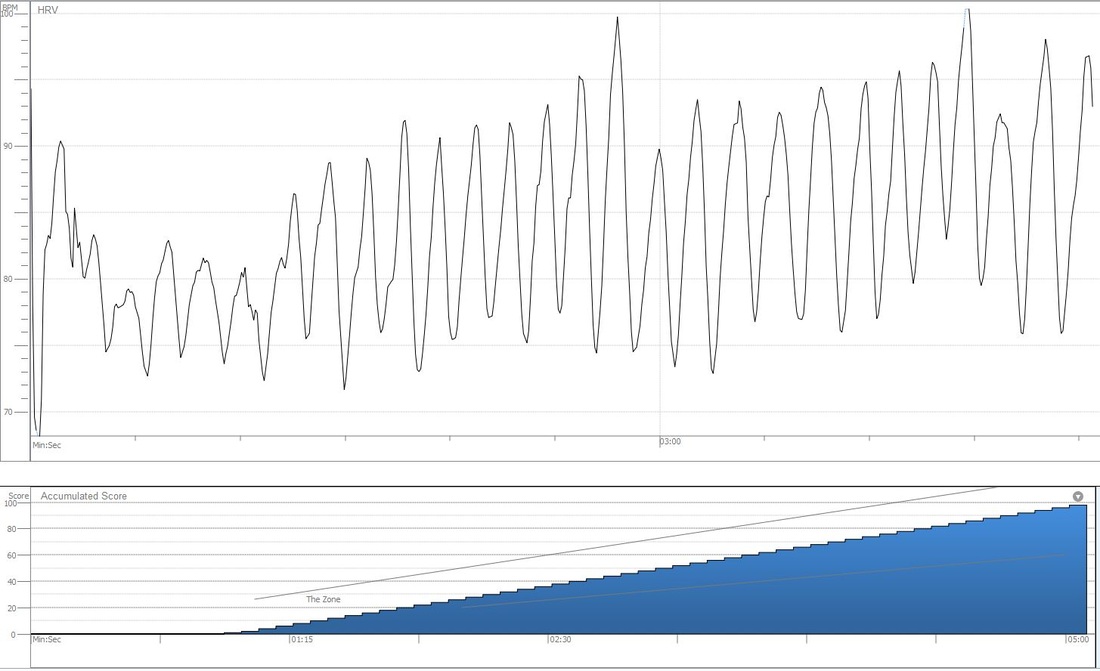|
Some say "no pain, no gain." I say: if it hurts, you're probably not doing it right. If you're exercising and it hurts, that can mean serious trouble. If you're experiencing emotional pain in you're life, that can also mean serious trouble. You may know some of these common effects of stress building up in your body and in your life:
These are good to know. They are some of the more apparent results of a stressed out life. But here are some you may not associate with stress:
Now, am I saying that just about everything is caused by stress? Nope. But living a high stress life with little outlet and ability to positively deal with stressful situations sets us up for failure. Our health is compromised, our relationships are strained and our general outlook on life is worse. Many of the above symptoms can be caused by a variety of factors, whether or not stress is present, so be sure to get a full check up and discuss any lab work that would be helpful for you and your doctor to best understand your health issues. A lot can be learned from simple blood tests and saliva tests (yep, pretty much just spitting in a test tube)- it's important to not overlook any potentially serious medical condition when working on balancing your physical and emotional health. I am here to answer any questions you have about this topic- you can comment on this article or email me directly. To your good health, More articles on stress and you:
Stress: what is it good for? From overwhelmed to overjoyed Stress vs. Well-Being: how do you measure up?
1 Comment
Recently I've been passing some good info and resources from the Institute of HeartMath.
For new-to-me readers, this is a wonderful resource for all things anti-stress. Using tools from them has literally pulled me from a stressaholic to a balanced, positive person ready to take on the world. Here's a gem to try out. The Stress and Well-Being Survey, it's free and takes just a few minutes. Like filling out online quizzes? I do. Plus, this one actually gives you much more important information than "What character would you be in Harry Potter?" ( I don't know, I confess I never really got into the series, so I'll just go with Hermione) The results give you estimates on how well you're doing in some pretty important areas of your life: Physical Vitality, Emotional Vitality, Social Connectedness, Spiritual Connectedness and Overall Well-being. I found my results interesting and revealing and I think you will, too. So what are you supposed to do with these results? Well, you could put it on your fridge, have a Spiritual Connectedness competition with your friends (joking, that's a terrible idea) or maybe this is yet another confirmation that there's something troubling you and you've just never wanted to seek help for it. Well, this is the sign you were looking for. Maybe you're feeling run down and exhausted all the time, even when you wake up (which is an awful way to start the day). Maybe the slightest things provoke you and send you into a major freak out state. Maybe the sight of a particular person's name in your inbox or on your phone shoots your heart rate sky high. This is no way to live. Find someone who will listen and help. I would love to help you out or find someone near you who can. Take care out there. It can be a stressful place, but that doesn't mean we have to be stress-cases in response. To your good health. Know what I love about HeartMath? Everything. Ok, so that's not very helpful. Let me explain. HeartMath really addresses the root of my patients' stress-related issues. I feel that this particular type of biofeedback, which uses guided intervention in heart rate variability patterning, gets to the bottom of issues which are so prevalent in our society (feeling stressed out, exhausted, nervous wrecks, overwhelmed, constant fatigue, the list goes on and on). So here's the whirl-wind intro, though you're always welcome to call for a complimentary 15 minute introductory consult... you can meet me and talk further about how I can help you achieve a better state of health. First, why would someone use HeartMath? Well, one of the most common reasons is a stress-related condition, such as anxiety, depression, insomnia, hypertension, attention disorders and chronic pain. Take a look at the many ways stress ruins your body and mind If the image above is a little blurry, here's the original
Bad, huh? Yes, in general, stress is bad. A little is ok, but most of us have waaaay more than a little stress in our lives. So how does HeartMath work? What is it doing? It's harnessing your innate heart-brain connection, and using that internal power for good (relaxation and restoration) instead of evil (panic attacks and out of control emotions). Trippy, huh? It is optimizing the communication between your nervous, cognitive hormone and immune systems to balance out any mis-signaling. Through this process you will learn to identify and remove all internal signals that, perhaps subconsciously, are working against you instead of for you. The end result? Common effects are increased happiness, more positive outlook on life, little or no stress reaction from what was before stress-inducing issues (work, relationships, finances), a full release from prior feelings of overwhelm and burnout and the ability to finally overcome a physical or hormonal issue (like those listed in the graphic above) just to name a few. This technique is simple, powerful, and transformative. Everyone should give it a try. How does this whole process work? You can learn from the decades of research and look up conditions and information important to you on the HeartMath website. They offer biofeedback devices to anyone, though working with a healthcare professional such as myself ensures proper monitoring, assistance and its optimal placement within a comprehensive wellness approach. I use HeartMath biofeedback during office visits and program check-ins for those who could benefit from its use as well as offer shorter stand-alone sessions. To best learn and implement the biofeedback techniques in your everyday life above and beyond the few times I guide you through the process. Most patients benefit from an initial round of 4-6 sessions which will be part of an all-inclusive integrative plan where all your healthcare issues are addressed and attended to. My current weight loss and stress reduction program, 'slim down & happy up,' includes HeartMath sessions during as many of the bi-monthly check-ins as you'd like. That means up to 6 HeartMath sessions are automatically included in the program, no extra cost at all! The next 'slim down & happy up' program will run 3 months, starting September 9th. Registration begins on our next session Monday, August 19th, check out the full details here. To your good health, 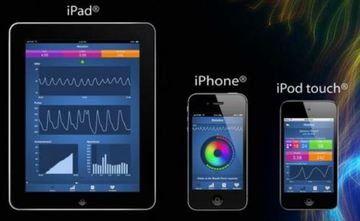 I love HeartMath. It's the only computer program that I can think of that I'd call a life saver. Others are useful, helpful or necessary for business operations. But not live savers. HeartMath is. It's for real. Myself and all my formerly-stressed-out patients who have experienced the biofeedback training using the HeartMath system can attest to this. At first, there was the emWave as a desktop or handheld version. I use the desktop version with myself and my patients (I do practice what I preach!). I usually have one or two handheld devices on hand for those patients who are most eager and committed to relieving their stress that they enthusiastically continue biofeedback training in their own time away from my office. Then a month ago I learned about the Inner Balance Sensor: the next generation version for the iPhone, iPad and iTouch. Check out the video all about it, and get brushed up on this innovative technology in under 3 minutes. It turns iPhones into biofeedback devices. That is seriously cool. Anyone can now access and use this technology in their daily lives. I've long been looking for a way to bring my in-office biofeedback sessions on the road. It's difficult to explain in words a concept that's instantly understood by just watching and experiencing biofeedback in action. Now when I'm out and about at meetings, presentations and other public events, I'll be able to fire up my iPad and have a scaled-down version ready to demonstrate on demand. I recently saw that Dave Asprey, the Bulletproof guy, recently endorsed the Inner Balance Sensor as well as provided a very comprehensive overview of how it works. He's known for dismantling the entire way that we eat, and reconstructing his Bulletproof diet based entirely on research findings for optimal human performance and activity. Check out his diet guidelines, they're pretty spot-on. As Dave Asprey's writings can be trusted to be firmly rooted in the scientific research, his articles are well worth a read: How to Biohack Your Courage, How HeartMath Training Helps You Live Longer, and Six Ways To Hack Your Nervous System. His theme is "biohacking" your body's physiology through the use of science, if you can't tell.
Well, that's my exciting news today, though there's much more in the works. But that will be exciting news for another day. To your good health,  Scanning my bio page, and you can sum up my education and experience within a few seconds. What you won't know is "Why?" Why do I do what I do? And ... what right do I have to tell you and everyone you know that stress isn't a given. I might not even know you, your aggravating boss, your mother who never leaves you alone, your kids who drive you up the wall with worry. None of it. I may not know anything that's going on in your life. So, just why do I think I am? Maybe it's because I'm the eldest child in my family. The stereotypical bossy older child. Don't ask my younger siblings- it's all lies. I'm motherly and nurturing not bossy. Or a matter of perspective, whatever. So, I get to tell you how to be healthy because I'm a doctor. I get to tell you how to do it from a really common sense, healthy approach which is supportive to your body, mind because I'm a Naturopathic Doctor. But why do I think you can ditch your stress? Because I've done it. I've crossed over that bridge- or maybe I choose to cross over again and again every day of my life. I used to be a nervous wreck. Really. You know the type. I was stressed out and living on my last nerve on a daily basis. I was a living mascot of those dorky "I have one nerve left, and you're on it" T-shirts, or seen here in chihuahua form. Or maybe it's not a chihuahua, I don't know (the only dog categories in my mind are: big, small, friendly and growling). Part of my stressed out picture comes from the fact that I've always been "busy." From childhood on, busy, busy, busy. You know, the kid who's in everything, and the co-ed who doesn't have a minute of down time. I've always been a big proponent of getting and keeping your priorities straight, so in addition to the work and school schedule, I've also always worked in exercise, family time, volunteer time and other activities. No time for me, no peace and quiet. And what did this big bundle of messy nerves look like? Well, on the outside, not too bad. On the inside, constant tension, stress, anxiety and unrest, a history of heart palpitations and sometimes worse. There's been the occasional panic attack (it's always fun when you feel like you can't breathe) and one week of anorexia. That was a real blast. Too sick to my stomach with anxiety to eat, too hungry to stop thinking about food. I'm no hero. After a week, I tried getting help from my doctor after being too nerve-shocked to eat for far too long. He recommended Ensure. Thanks, but no thanks. After life circumstances became less crazy, my condition improved. 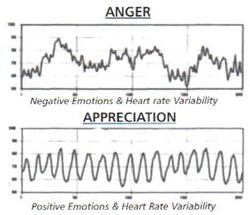 Jaggedy = bad. Smooth = good. Jaggedy = bad. Smooth = good. Fast-forward to the middle of my internship years. One day while working with a patient's history of anxiety and panic attacks, I got some first hand experience with a weird-sounding computer program. HeartMath. I had heard about this "HeartMath" thing the year prior during a Cardiology lecture. The same lecturer was now my attending physician and was training me in how to use it with patients. On my first go-around in class, it sounded like this breathing and self-guided visualization thing that somehow helped with heart disease and anxiety. And, yep, that's pretty much it in a nutshell. I practice what I preach. It didn't take long after learning how to use HeartMath with patients for me to experiment on myself. And the effects I first initially and every day since is what propels me to use it as a key part of my clinical practice. Bonus for me- no more being stressed out all the time, and definitely no panic attacks and upset stomach. Every day that I use the HeartMath system, I can see myself building up my internal reserves. Stressed to relaxed. Upset to calm. Tired to energized. And I can feel the effects whenever I do it, computer monitor or not. In the car, in the shower- there's nothing more portable and easy to use any time than your thoughts and your breath. Here's an actual screen capture of a session I did a few months ago: This is a six minute session. You can see the raggedy-jaggedy-ness on the left (= low coherence). This pattern smooths out and from a minute in until the end there is a much more smooth sine wave-like pattern (= high coherence). That's good. That's what you want. That's what is the actual key to reducing stress. The bottom graph is internal coherence built up over time. More blue equals less stress.
This is just one of many tools I use for myself and others who are stress-prone, but it's a very foundational tool nonetheless. I just wouldn't have the impact that I do in helping all us stress cases to relax and unwind. It creates real, appreciable change to permanently alter our stress response. I love the many uses of HeartMath. For some I use it to curb a stressaholic's tendency to freak out. For others it's an immediate way in the office to snap someone out of acute anxiety- this will even work during a full-blown panic attack. How great is that? If you know someone who's a stressed out mess, send them my way. I am a guide with a tried and true map which will help them leave the Land of the Last Nerve and arrive at Chill City. Won't you join me? That's who I am. I am here, happy and eager to help. If you want to be Happy, Healthy and Wise, let me help you with two of these three (wisdom not included). 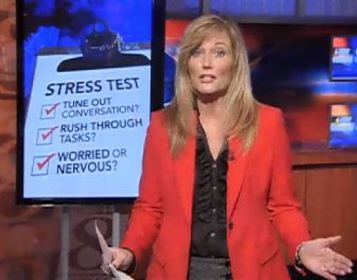 Last Friday, local KGW news showed a news segment on stress and started out with a simple three question test. How many of these do you do?
Thank you, because not only was I stressed out about being stressed out, but now I have to worry about being addicted to stress. Is there such a thing as Stressaholics Anonymous? But in all seriousness, I have referenced what I believe are the top symptoms of stress, and many of them are a lot more hidden than just feeling "worried or nervous." So stress and its health effects are suddenly being covered in the local news. First the Oregonian article, now this video from KGW. Well, as stress affects most of us, it's a very relevant topic. In my next article, I'd like to detail just exactly what it is I do to counter the effects of stress. If you've seen past articles you know that biofeedback is an important tool of mine, but it's not very well known so I'd like to let you in on this ace up my sleeve. Next time. To your good health,  In an ever-developing expansion of my reach on the internet, PDX Holistic has featured Stress: what is it good for? At PDX Holistic, you can find my directory listing, find other holistic practitioners in Portland and get up-to-date articles and information straight from alternative medicine practitioners such as myself. Absolutely nothing. Ok, so that's not entirely true. But 99.9% of reactions to stress nowadays are harmful and unnecessary. Here's a whirlwind tour on what stress is doing to you and your body, why it sucks, and what you can do about it to have a happier, more kick ass life. Most of us have heard that the physiologic (body) response to stress has evolved to run away from woolly mammoths or saber tooth tigers or something along those lines. Well, ok, great, but we were also club-swinging unibrow-sporting troglodytes (word of the day for ya). Things have changed. So why on earth would morning traffic and work deadlines cause the same effects in your body as a near-death experience as the hands (or claws?) of a neolithic lion? Because, for the most part, deep deep down in your genes and cells, not much has changed. You're still living, breathing and metabolizing like its 1999. B.C that is. And what is stress and who defines it anyways? What cranks one person's stress-o-meter up to 11 (public speaking anyone?), is exciting, challenging and enjoyable to another. Well, the million dollar answer is: that person, thing, event or activity that is "stressful" is only stressful because you're responding stressfully to it. Ok, before I go too esoteric and off into "what is is" land, let me break it down another way: stress as a word was not created to describe a human physiologic response. It came from civil engineering, and only afterwards did biology researchers take the idea and apply it to the human body. Stress is a force from the outside that is exerting its effects in you (or a bridge, but why split hairs). Or to quote the never-wrong wikipedia, "stress is a measure of the internal forces acting within a deformable body." Sexy definition, right? So something is trying to deform your body (boss breathing down your neck, kids going nuts, no time to yourself) and stress is the amount those things are affecting you, internally. But. But. The real kicker of all this is you have a choice in the matter. You can choose how all those external forces affect your internal forces and deform your body. (ok, I'll stop with the engineering talk) There are many ways you can respond physiologically (and emotionally) to potentially stress-inducing events and interactions. How do you respond? Crack like an eggshell? Crumble like saltine?
How do you want to respond? Bounce back from any hardship like a superball? Nonchalantly and gracefully move from one project to the next like a slinky? You may have minimal influence over commuter traffic, paying the bills and having a ever-expanding to do list with never enough time-- but what you do have maximal influence over is your response. This is more than a matter of "just think good thoughts" or "quit your job and move to Fiji" (though if you're looking to take a concierge doctor to Fiji with you, let me know). I work with people to build up their internal reserves so that they can react to life more like a slinky and less like an eggshell. Getting and maintaining that attribute is a process (unless you do just move to Fiji)- but one that when working together, I have always seen stress diminish, anxiety dissolve and positivity and resilience grow in their place. And from that standpoint, you can take on the tigers and bosses without losing your cool. To your good health, Well, I mean kids' brains have a lot of plasticity. That means flexibility, right down to each nerve and its connection with other brain cells. At this point, I think I may be to old to be a protege of any sort, and I wasn't one of those kids who is a violin or calculus genius. No, I think "spazzy" might have been used more commonly. Or "very active," "busy" or "curious" if one was trying to be nice. I like to think that I was just very interested in everything, and wanted to do everything at once. But if I had ever become too much for my parents, I very well could have ended up with an ADHD diagnosis (or ADD as it was known just a few years ago). Lucky for me I grew up in the time before prolific medication of young ones. Today, around 5-7% of school-aged children are diagnosed with ADHD and with the development and widespread use of medication for this population, many children are on behavior-altering medications for years. Both intentionally and unintentionally, this affects developing brains, since the meds specifically target the part of the brain which is most plastic (prefrontal cortex), which actively grows and matures into one's 20s. At the bottom of the page is the full research article I came across recently- it's 9 pages long and dense on the topic of psychophysiological coherence- one of my professional passions. This is what I am tapping into when I use when I train people with stress and anxiety using in-office and at-home biofeedback therapy techniques. Knowing how simple and powerfully effective it is in children (and adults) with ADHD, I incorporate biofeedback into my patient plans before starting strong, potentially habit-forming psychostimulants- particularly with my pediatric patients. To sum up the research results, all of the children (ages 6-8 grade) showed improved cognitive function and behavior after a series of 6 weekly biofeedback sessions (involving a Heartmath game to make it fun). Some of the surprising findings are that most of the kids were using Heartmath skills every day after a three month check in, on their own, with no adults prompting them. Another is that some (18%) of the children at that check in were completely off their psychostimulant medication (at be beginning of the study, all the children were medicated). No parent wants their child to be excessively medicated- and with some emotional and psychological conditions, medication can allow someone to better function in their day to day activities. Looking at non-pharmacologic options is my focus when working with children (and adults) with ADHD, and I look forward to continue reinforcing these positive results using biofeedback for these individuals. As with any chronic issue, there are often multiple factors at play- people experiencing ADHD often have food or chemical allergies or sensitivities for example- so my approach always takes into consideration each patient's unique history in order to make a customized plan of action for improved quality of life. Stay happy, healthy and warm,
 Gusts, flurries and dustings of snow. It's Portland, so we don't actually own snow shovels. Nine times out of 10 the snow doesn't even stick. And we like it that way, or else we frequent Mt. Hood. My question is, how does the snow affect you? Are you running out the door to make snow angels (well, don't do that right now, or they'd be sludge angels) or do you curse the weather and all the bad drivers it brings?  For most of us in town, an inch or two is enough to completely change our day, our schedule and our routine. Schools are cancelled, trips across town are suddenly monumental tasks and businesses are suddenly and inexplicably closed (hey, they don't want to drive in the snow with Portlanders any more than you do). Not all work grinds to a halt. Many must continue trekking to work and raising an already high level of work-related stress to nearly unbearable levels. So before you get stuck in the next "big" snow, being pulled every direction by demands (go in to work and finish the project or go sledding on bunny slopes?), take a minute to recognize and readjust your expectations to living a life in overwhelm mode. Do you feel:
These are some of the most common expressions of an overwhelmed life crumpling under time pressure and demands. Don't resign yourself to living under these constraints, there is a way out- I promise. Read more here and let's chat soon.
To life, health, and warm cups of tea, |
Archives
June 2024
Categories
All
|
||||||
about the doc |
patient infocontact |
|
Privacy Policy
© Copyright 2011-2024, Dr. Angela Cortal ND LLC website content is for educational purposes only and is no substitute for medical advice (see the Terms of Use Agreement for this site), you must establish a doctor-patient relationship to receive that! |


